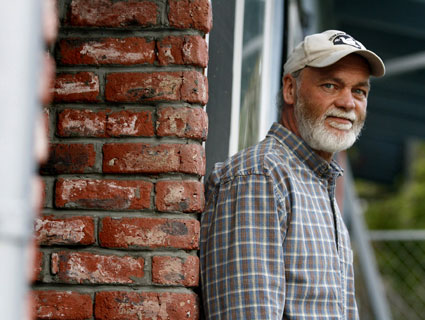
A disabled Navy veteran stands in front of his foreclosed home.Crista Jeremiason/ZUMA
This article was produced by the investigative reporting workshop at American University in partnership with New America Media.

After the Second World War, returning veterans were welcomed home to two of the most successful government initiatives ever—the Federal Housing Administration (FHA) and Veterans Affairs housing programs—which put millions of them into their own homes for the first time.
Today, later generations of veterans are being confronted by much different housing policies—ones that can toss them out of homes they’ve bought with their life savings.
John Aguiar is a veteran of the Gulf War, a former intelligence analyst for the Army who took part in Operation Desert Storm in 1990 when US forces brought Saddam Hussein to heel after he invaded Kuwait.
Aguiar and his wife, Syrena, built a house in southwest Florida after relocating from Chicago to be closer her parents. Using proceeds from the sale of their Chicago house, they bought a lot in a new subdivision in Cape Coral, a middle-class suburb across from Fort Myers.
The house they built reflected their values and way of life. It was nothing fancy: a one-story Cape rancher with three bedrooms, two baths, and a two-car garage. There were no granite countertops, no Jacuzzi—just the basics, in keeping with what they could afford. “We always lived within our means,” Syrena says. Nor did they see it as a steppingstone to something larger. “It was all we wanted, a place to raise our kids,” John says. “We wanted to retire there.”
But the mortgage, like so many at the time, contained a ticking time bomb. Their bank had given them an adjustable-rate mortgage, one of the products being aggressively promoted by the deregulated mortgage industry, and soon they were struggling when their monthly payments ballooned. Then Aguiar lost his job in a housing-materials firm when his division was shut down. He cashed out a pension plan from a former employer, drained his 401(k) account, and worked part time at a Home Depot. “We did everything we could to try to hold on to the house,” he says. But it wasn’t enough.
When their bank refused their appeal to adjust their mortgage payment, foreclosure began and the family soon lost the house. John, Syrena, and their two school-aged children moved in with Syrena’s parents. When John still couldn’t find work in Florida he took a job with a trucking company in Chicago and moved in with relatives, separated from his wife and children by 1,300 miles.
“We had the American dream,” Syrena says, “and it was taken from us.”
Not the Only Ones
The Aguiars have lots of company. Veterans have always faced daunting problems in finding jobs, obtaining promised benefits and meeting other challenges when they reenter civilian life. But to those problems has been added the fear of losing their homes. The Fort Myers-Cape Coral region, home to about 60,000 veterans, is a microcosm of what is happening to former service people all over America.
You can hear their stories almost every day at the Veterans Foundation of Cape Coral, lodged in a nondescript, one-story storefront set back from busy Del Prado Boulevard. Three years ago the foundation didn’t exist, but escalating problems led a group of former service people to band together and create a center to provide food, counseling, and other help to beleaguered veterans.
“We have guys coming in here as often as you can imagine who are losing their homes and not knowing what to do,” says Ralph A. Santillo, president of the group, himself embroiled in a foreclosure case on his own house. “There’s a whole group out there in this position, and it is growing.”
Just how many veterans fall into this category isn’t clear. Veterans Affairs assisted 66,000 who defaulted last year alone just on VA loans. But that number did not include the tens of thousands of other veterans who faced foreclosure on FHA or conventional mortgages that many took out to survive. And of course the number does not include reservists or National Guard personnel who fell behind on payments when they were called up for multiple tours in Iraq, Afghanistan, or both.
While the Cape Coral center provides help to veterans of every era, Santillo said the foreclosure crisis is much worse among older veterans, many of whom have owned their homes for 15 or 20 years.
“They’re living on a fixed income, usually just Social Security, sometimes a little pension,” Santillo says. “All their costs are going up—insurance, taxes. Most times when people refinanced they used that money just to keep up with their bills and pay their mortgage. So there was no real benefit. It was not like people were going to get rich and live off the money.”
Santillo said banks and financial institutions made it so easy to borrow money that a lot of people were trapped.
“There was stuff out there like no-interest loans or loans where you paid 1 percent interest,” he says. “Then all of a sudden you find out two years down the road you are paying $5,000 a month. Some of these were usurious. They would have put you in jail for that years ago.”
Making matters worse, says Donald Graf, executive vice president of the veterans foundation, is that once veterans encounter financial difficulties, the banks refuse to even discuss a mortgage modification that might make it possible for people to stay in their homes.
“All of us have felt the sting of the banks,” he says. “If you had an IRA and you thought that was secure, that was taken away. If you had equity in your house and you thought you could sell it and move into an assisted-living facility with the money, that’s gone from you. People are knocking on our door asking for help so we are getting into areas we didn’t before.”
County Swamped by Foreclosures
More than one veteran facing foreclosure has found himself caught up in the mass foreclosure court created by Lee County, across the river in Fort Myers. An epicenter of the crisis in the United States, Lee County became so swamped by foreclosures that it created a special court to handle them.
The “rocket docket,” as it’s called, lets judges process foreclosure cases with the speed of an assembly line. On any given day, hundreds of cases may be heard by a judge in a crowded fifth-floor courtroom of the Lee County Justice Center. Sometimes the docket is so packed with cases that another courtroom is set aside to handle the overflow.
Lawyers representing banks rise and approach the bench. The case citation is read into the record. Usually no one is present to represent the property owner. Even when a homeowner’s lawyer is present, the process takes only a few minutes. The judge invariably rules in favor of the bank, according to lawyers representing homeowners.
Since 2006, when the housing bust began hitting southwest Florida, more than 75,000 foreclosure cases have been filed in Lee County—this in a county with a population of 618,754, according to the 2010 census. The volume has slowed in the last year, but there is still a backlog of nearly 8,000 cases awaiting hearing.
Attorneys who represent homeowners before the court say that Lee County’s expedited proceedings permit banks to run roughshod over the rights of homeowners. If a homeowner is behind in a payment, regardless of the reason, judges almost always rule for the bank, they say, even when there are extenuating circumstances that should be considered.
“Being current on one’s mortgage is not the sole issue in a foreclosure case,” says Todd Allen, a lawyer in Naples, Florida, who has represented 235 property owners in foreclosure, mostly in Lee County. “Discovery may yield evidence that refutes a plaintiff’s standing, or it may reveal fraud…behind a particular foreclosure proceeding,” Allen wrote in a court affidavit. “Categorically refusing to allow homeowners to proceed with discovery therefore undercuts their ability to develop their case and present all defenses that may be available to them.”
Allen said that Lee County officials are apparently rushing to judgment because they believe that the sooner they dispose of houses in foreclosure, the sooner the local economy will rebound.
“The idea that you kick people out of their houses, then the economy will return, I think it’s a false premise,” Allen says. He says that mortgage fraud and ownership questions surrounding many quick foreclosures will mean authorities will have to deal with the problem for years. “It would all work better if the banks just helped consumers and threw them a lifeline,” he says. “Now they have to pay thousands to go through foreclosure.”
Running Through Savings
Typical of homeowners with extenuating circumstances who’ve been caught up in the Lee County foreclosure mill is Georgi Merrigan.
A paramedic, Merrigan quit her job to care for her husband, who was critically ill from a combination of severe health problems and injuries suffered in a catastrophic car wreck that confined him to a wheelchair for months. With no money coming in, the couple soon ran through their savings and retirement accounts to pay the mortgage on their Cape Coral home.
When she approached her mortgage company for a modification, Merrigan said she was told that the company wouldn’t be able to negotiate until she was 90 days in arrears on the mortgage. Taking that cue, she didn’t make a payment for three months. Then, according to Merrigan, the company refused to make a realistic offer to modify and instead instituted a foreclosure action against her. The company was Countrywide Home Loans, the poster child for fraud and abuse in subprime mortgages and liar loans. Its practices cost investors billions of dollars and helped to collapse the American housing market.
Some politicians blame the avalanche of foreclosures on a federal policy of easy money that they claim pushed many first-time homebuyers into purchasing houses they couldn’t afford.
But many victims are like the Aguiars, hard-working families who owned a home for years and who were victimized by the convergence of deceptive practices of the unregulated mortgage industry—Ralph Santillo calls them “trick mortgages”—and a tanking economy.
Disastrous Move: Fixed-Rate to Adjustable
When the Aguiars bought their lot in western Cape Coral, they had a fixed-rate mortgage of 6 percent. Florida’s real estate industry was booming, and John landed a job with a building-materials company. Syrena worked as a mortgage broker.
Their troubles began when the City of Cape Coral hit them with a bill for $20,000 to connect to the city’s water and sewer system. When they built their house, they had been led to believe that city water and sewer were years away, so they had spent $22,000 to drill a well and build a septic system, which now wasn’t needed. Because they had sunk everything into the house, they were forced to refinance.
This time the mortgage company substituted an adjustable-rate mortgage for their fixed rate. “I didn’t know it was an adjustable-rate mortgage until it was a done deal,” Syrena says. “Then it was too late.” At first, they were able to handle the monthly payment, which rose from $1,100 a month to $1,400.
But the interest rate on the new mortgage continued to climb just as the Florida economy began to falter. Worried that his job in the housing-related field might not be safe, John began moonlighting 20 to 25 hours a week on nights and weekends at a Home Depot. Then his company closed its Fort Myers area office, and he lost his day job.
John and Syrena scraped to pay the mortgage, cutting back on expenses and depleting their savings and retirement accounts. Their monthly mortgage payment soared to $2,000 a month. “The mortgage payment just kept getting higher,” John says, “and we kept sending out one more payment, one more payment, one more payment, until we could figure out what we were going to do.” They tried to negotiate with their mortgage company to lower the interest rate, “but they didn’t want anything to do with us,” Syrena says.
The Aguiars were swept aside by one of the powerful forces driving foreclosures—the company servicing the mortgage did not own the loan and so had no incentive to offer an arrangement that might let the family stay in their home until they got back on their feet financially. In an earlier time things would have been different. After World War II and the Korean War, the federal government oversaw housing programs that did not permit the kind of financial gimmickry by Wall Street, banks, and investors that have proven so destructive to the Aguiars, other veterans, and millions of other middle-class Americans.
In 2009, with their mortgage company turning a deaf ear, the Aguiars could no longer come up with the ever higher monthly mortgage payments and were facing foreclosure.
Shortly before they were to appear in foreclosure court, the mortgage company gave them permission to short-sell their house. It sold fairly quickly (at a loss, of course), and the family moved in with her parents in September 2009.
When John took the job in Chicago in shipping for the huge trucking company, YRC, Syrena and their two children stayed in Florida. John couldn’t visit them for nearly a year, in part because of unexpected medical problems, which included a hospital stay for complications from diabetes. So for now they visit mostly by phone.
“When we lived in our house, we had the American dream,” Syrena says. “We had our family. We had good jobs, we had a nice house that we built, we had a dog, we had a cat, and we were happy. And then one day we woke up and everything started going backward on us. We just want to get our lives back together.”











